Consumer Behavior Report
VerifiedAdded on 2019/12/03
|14
|5296
|36
Report
AI Summary
This report delves into the significance of consumer behavior in marketing, emphasizing the role of nostalgia. It examines the concept of nostalgia, its functions in shaping consumer behavior, and its key determinants (attitude and emotion). The report further analyzes the role of nostalgia in influencing purchasing decisions, highlighting how marketers utilize nostalgic advertising to evoke positive emotions and past memories, thereby fostering brand loyalty and driving sales. The conclusion underscores the importance of understanding nostalgia's impact on consumer behavior for effective marketing strategies. The report extensively cites various academic sources to support its findings.
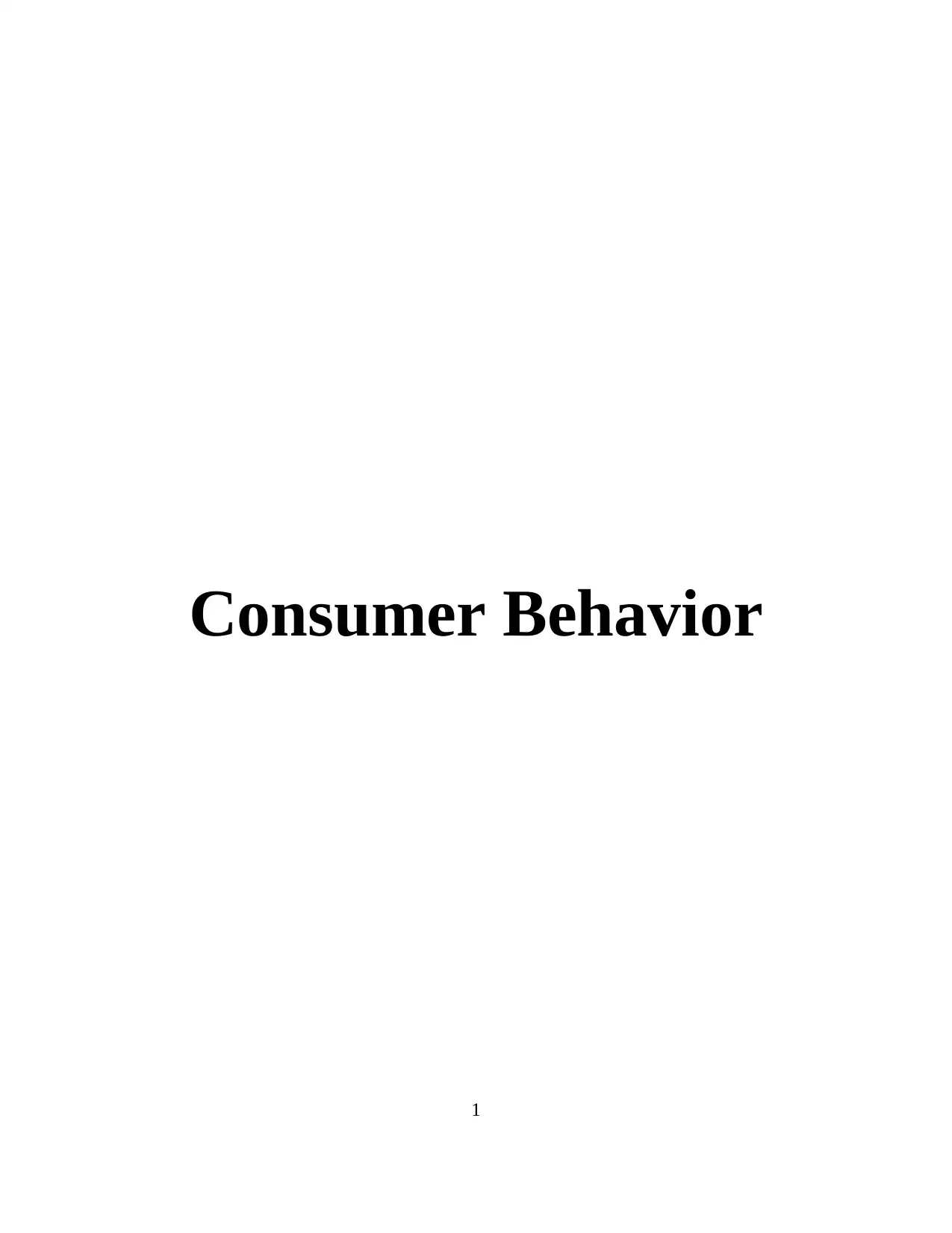
Consumer Behavior
1
1
Paraphrase This Document
Need a fresh take? Get an instant paraphrase of this document with our AI Paraphraser
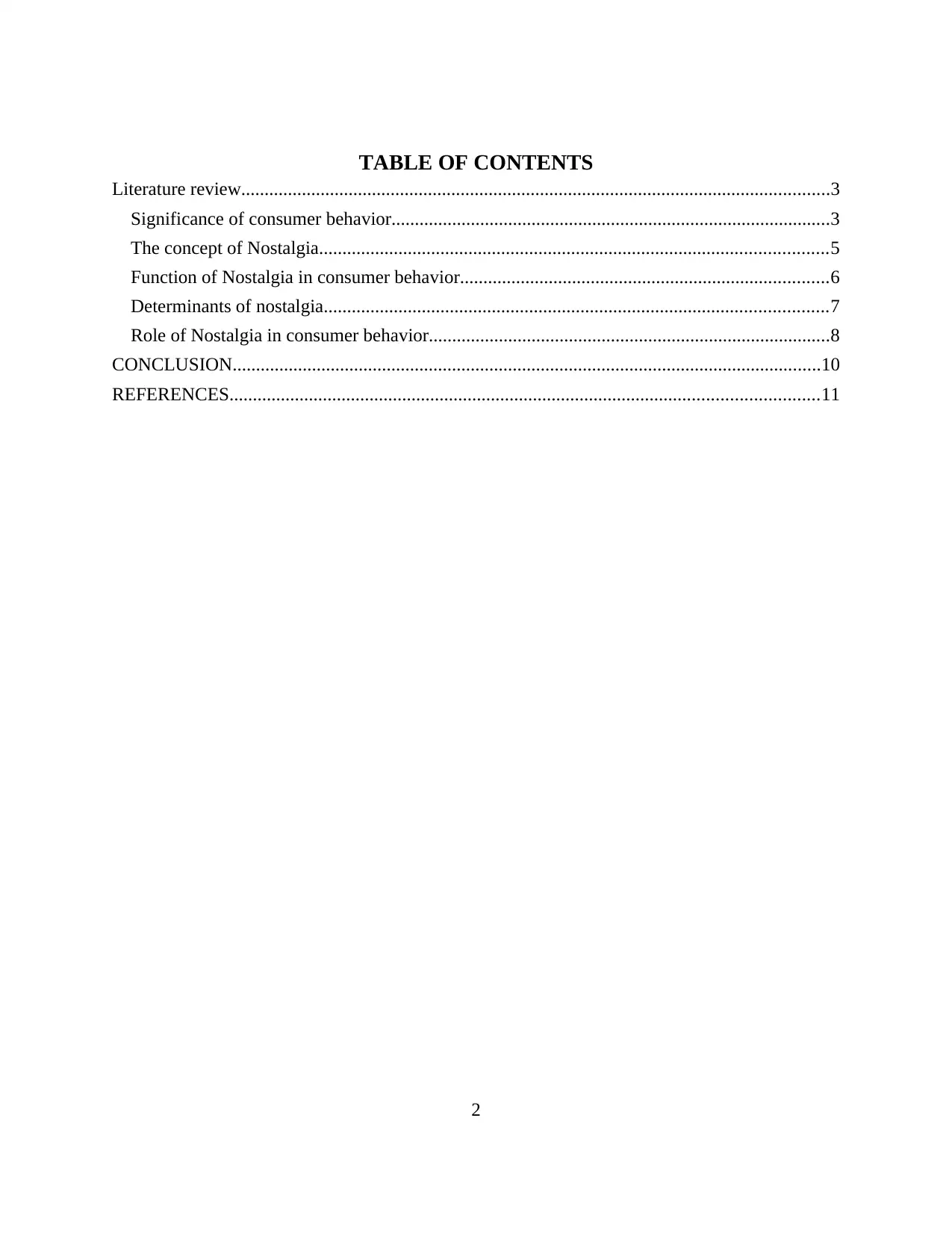
TABLE OF CONTENTS
Literature review..............................................................................................................................3
Significance of consumer behavior..............................................................................................3
The concept of Nostalgia.............................................................................................................5
Function of Nostalgia in consumer behavior...............................................................................6
Determinants of nostalgia............................................................................................................7
Role of Nostalgia in consumer behavior......................................................................................8
CONCLUSION..............................................................................................................................10
REFERENCES..............................................................................................................................11
2
Literature review..............................................................................................................................3
Significance of consumer behavior..............................................................................................3
The concept of Nostalgia.............................................................................................................5
Function of Nostalgia in consumer behavior...............................................................................6
Determinants of nostalgia............................................................................................................7
Role of Nostalgia in consumer behavior......................................................................................8
CONCLUSION..............................................................................................................................10
REFERENCES..............................................................................................................................11
2
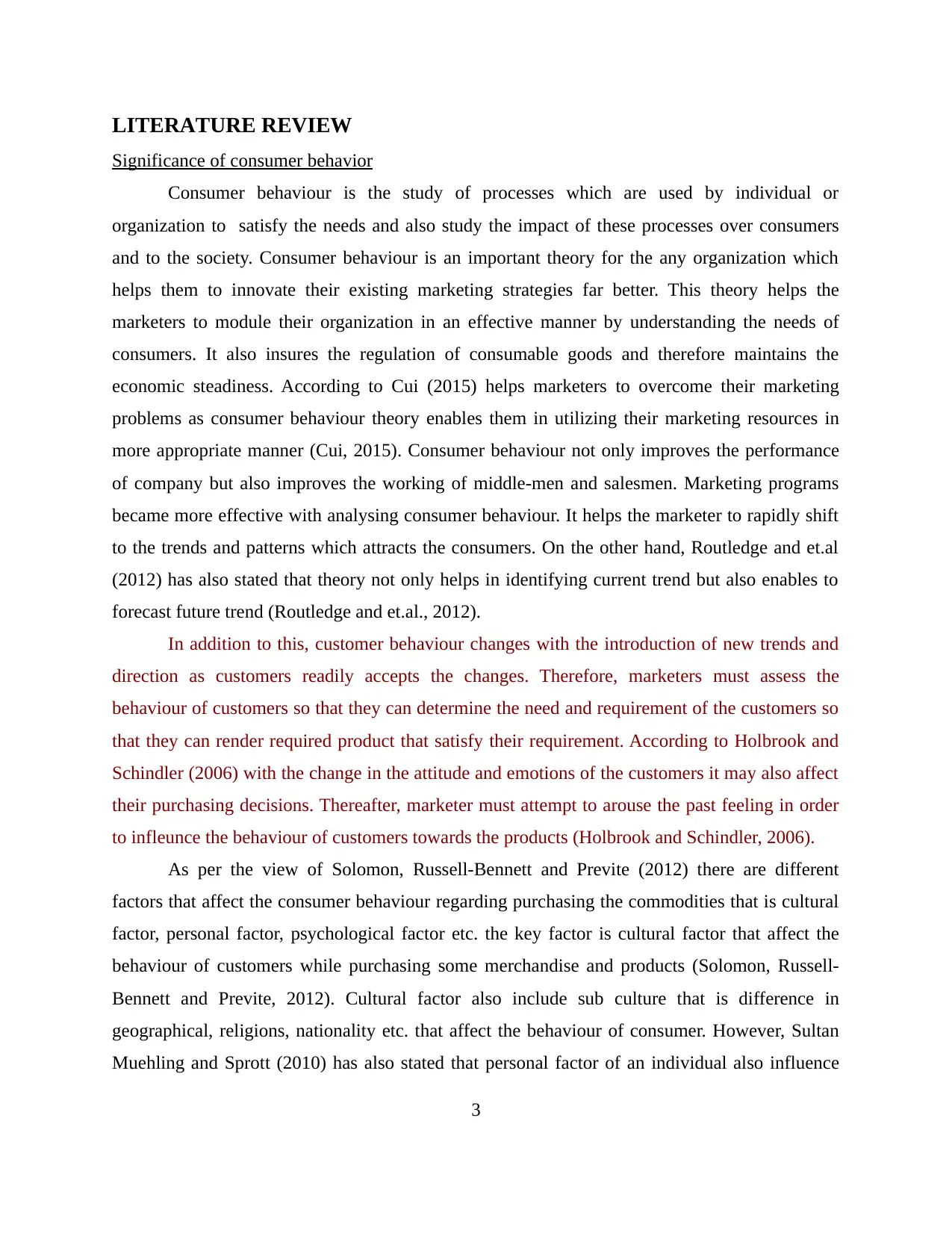
LITERATURE REVIEW
Significance of consumer behavior
Consumer behaviour is the study of processes which are used by individual or
organization to satisfy the needs and also study the impact of these processes over consumers
and to the society. Consumer behaviour is an important theory for the any organization which
helps them to innovate their existing marketing strategies far better. This theory helps the
marketers to module their organization in an effective manner by understanding the needs of
consumers. It also insures the regulation of consumable goods and therefore maintains the
economic steadiness. According to Cui (2015) helps marketers to overcome their marketing
problems as consumer behaviour theory enables them in utilizing their marketing resources in
more appropriate manner (Cui, 2015). Consumer behaviour not only improves the performance
of company but also improves the working of middle-men and salesmen. Marketing programs
became more effective with analysing consumer behaviour. It helps the marketer to rapidly shift
to the trends and patterns which attracts the consumers. On the other hand, Routledge and et.al
(2012) has also stated that theory not only helps in identifying current trend but also enables to
forecast future trend (Routledge and et.al., 2012).
In addition to this, customer behaviour changes with the introduction of new trends and
direction as customers readily accepts the changes. Therefore, marketers must assess the
behaviour of customers so that they can determine the need and requirement of the customers so
that they can render required product that satisfy their requirement. According to Holbrook and
Schindler (2006) with the change in the attitude and emotions of the customers it may also affect
their purchasing decisions. Thereafter, marketer must attempt to arouse the past feeling in order
to infleunce the behaviour of customers towards the products (Holbrook and Schindler, 2006).
As per the view of Solomon, Russell-Bennett and Previte (2012) there are different
factors that affect the consumer behaviour regarding purchasing the commodities that is cultural
factor, personal factor, psychological factor etc. the key factor is cultural factor that affect the
behaviour of customers while purchasing some merchandise and products (Solomon, Russell-
Bennett and Previte, 2012). Cultural factor also include sub culture that is difference in
geographical, religions, nationality etc. that affect the behaviour of consumer. However, Sultan
Muehling and Sprott (2010) has also stated that personal factor of an individual also influence
3
Significance of consumer behavior
Consumer behaviour is the study of processes which are used by individual or
organization to satisfy the needs and also study the impact of these processes over consumers
and to the society. Consumer behaviour is an important theory for the any organization which
helps them to innovate their existing marketing strategies far better. This theory helps the
marketers to module their organization in an effective manner by understanding the needs of
consumers. It also insures the regulation of consumable goods and therefore maintains the
economic steadiness. According to Cui (2015) helps marketers to overcome their marketing
problems as consumer behaviour theory enables them in utilizing their marketing resources in
more appropriate manner (Cui, 2015). Consumer behaviour not only improves the performance
of company but also improves the working of middle-men and salesmen. Marketing programs
became more effective with analysing consumer behaviour. It helps the marketer to rapidly shift
to the trends and patterns which attracts the consumers. On the other hand, Routledge and et.al
(2012) has also stated that theory not only helps in identifying current trend but also enables to
forecast future trend (Routledge and et.al., 2012).
In addition to this, customer behaviour changes with the introduction of new trends and
direction as customers readily accepts the changes. Therefore, marketers must assess the
behaviour of customers so that they can determine the need and requirement of the customers so
that they can render required product that satisfy their requirement. According to Holbrook and
Schindler (2006) with the change in the attitude and emotions of the customers it may also affect
their purchasing decisions. Thereafter, marketer must attempt to arouse the past feeling in order
to infleunce the behaviour of customers towards the products (Holbrook and Schindler, 2006).
As per the view of Solomon, Russell-Bennett and Previte (2012) there are different
factors that affect the consumer behaviour regarding purchasing the commodities that is cultural
factor, personal factor, psychological factor etc. the key factor is cultural factor that affect the
behaviour of customers while purchasing some merchandise and products (Solomon, Russell-
Bennett and Previte, 2012). Cultural factor also include sub culture that is difference in
geographical, religions, nationality etc. that affect the behaviour of consumer. However, Sultan
Muehling and Sprott (2010) has also stated that personal factor of an individual also influence
3
⊘ This is a preview!⊘
Do you want full access?
Subscribe today to unlock all pages.

Trusted by 1+ million students worldwide
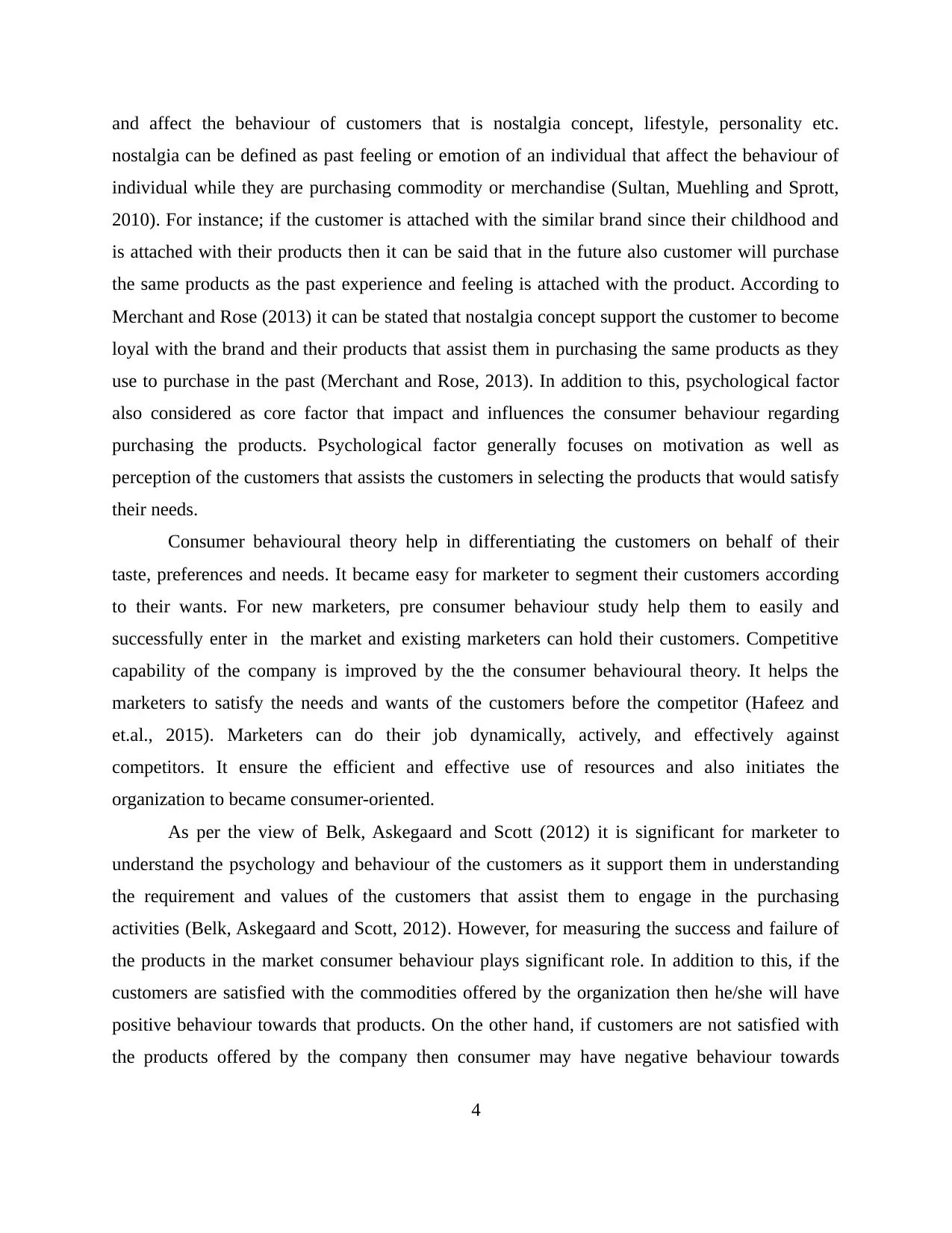
and affect the behaviour of customers that is nostalgia concept, lifestyle, personality etc.
nostalgia can be defined as past feeling or emotion of an individual that affect the behaviour of
individual while they are purchasing commodity or merchandise (Sultan, Muehling and Sprott,
2010). For instance; if the customer is attached with the similar brand since their childhood and
is attached with their products then it can be said that in the future also customer will purchase
the same products as the past experience and feeling is attached with the product. According to
Merchant and Rose (2013) it can be stated that nostalgia concept support the customer to become
loyal with the brand and their products that assist them in purchasing the same products as they
use to purchase in the past (Merchant and Rose, 2013). In addition to this, psychological factor
also considered as core factor that impact and influences the consumer behaviour regarding
purchasing the products. Psychological factor generally focuses on motivation as well as
perception of the customers that assists the customers in selecting the products that would satisfy
their needs.
Consumer behavioural theory help in differentiating the customers on behalf of their
taste, preferences and needs. It became easy for marketer to segment their customers according
to their wants. For new marketers, pre consumer behaviour study help them to easily and
successfully enter in the market and existing marketers can hold their customers. Competitive
capability of the company is improved by the the consumer behavioural theory. It helps the
marketers to satisfy the needs and wants of the customers before the competitor (Hafeez and
et.al., 2015). Marketers can do their job dynamically, actively, and effectively against
competitors. It ensure the efficient and effective use of resources and also initiates the
organization to became consumer-oriented.
As per the view of Belk, Askegaard and Scott (2012) it is significant for marketer to
understand the psychology and behaviour of the customers as it support them in understanding
the requirement and values of the customers that assist them to engage in the purchasing
activities (Belk, Askegaard and Scott, 2012). However, for measuring the success and failure of
the products in the market consumer behaviour plays significant role. In addition to this, if the
customers are satisfied with the commodities offered by the organization then he/she will have
positive behaviour towards that products. On the other hand, if customers are not satisfied with
the products offered by the company then consumer may have negative behaviour towards
4
nostalgia can be defined as past feeling or emotion of an individual that affect the behaviour of
individual while they are purchasing commodity or merchandise (Sultan, Muehling and Sprott,
2010). For instance; if the customer is attached with the similar brand since their childhood and
is attached with their products then it can be said that in the future also customer will purchase
the same products as the past experience and feeling is attached with the product. According to
Merchant and Rose (2013) it can be stated that nostalgia concept support the customer to become
loyal with the brand and their products that assist them in purchasing the same products as they
use to purchase in the past (Merchant and Rose, 2013). In addition to this, psychological factor
also considered as core factor that impact and influences the consumer behaviour regarding
purchasing the products. Psychological factor generally focuses on motivation as well as
perception of the customers that assists the customers in selecting the products that would satisfy
their needs.
Consumer behavioural theory help in differentiating the customers on behalf of their
taste, preferences and needs. It became easy for marketer to segment their customers according
to their wants. For new marketers, pre consumer behaviour study help them to easily and
successfully enter in the market and existing marketers can hold their customers. Competitive
capability of the company is improved by the the consumer behavioural theory. It helps the
marketers to satisfy the needs and wants of the customers before the competitor (Hafeez and
et.al., 2015). Marketers can do their job dynamically, actively, and effectively against
competitors. It ensure the efficient and effective use of resources and also initiates the
organization to became consumer-oriented.
As per the view of Belk, Askegaard and Scott (2012) it is significant for marketer to
understand the psychology and behaviour of the customers as it support them in understanding
the requirement and values of the customers that assist them to engage in the purchasing
activities (Belk, Askegaard and Scott, 2012). However, for measuring the success and failure of
the products in the market consumer behaviour plays significant role. In addition to this, if the
customers are satisfied with the commodities offered by the organization then he/she will have
positive behaviour towards that products. On the other hand, if customers are not satisfied with
the products offered by the company then consumer may have negative behaviour towards
4
Paraphrase This Document
Need a fresh take? Get an instant paraphrase of this document with our AI Paraphraser
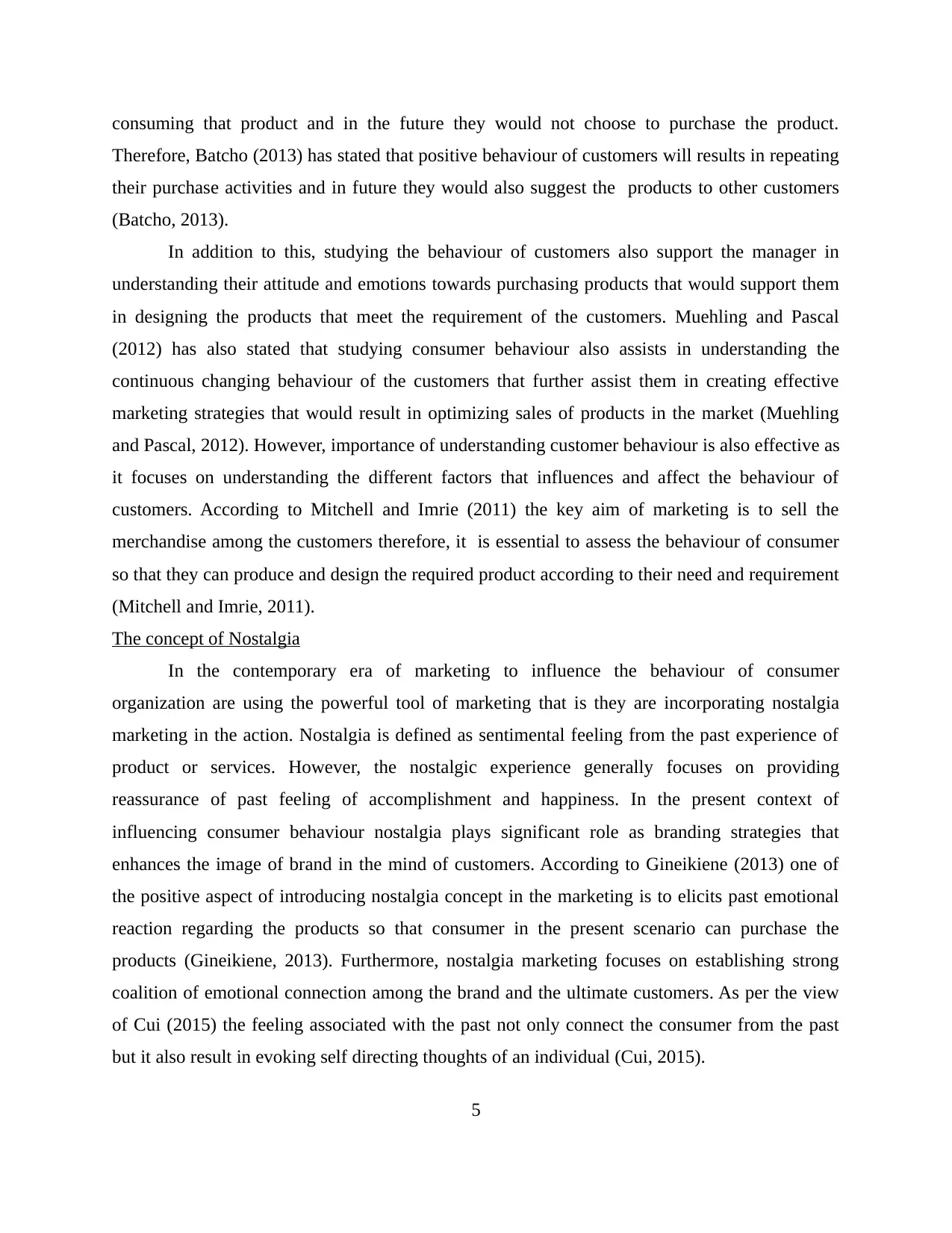
consuming that product and in the future they would not choose to purchase the product.
Therefore, Batcho (2013) has stated that positive behaviour of customers will results in repeating
their purchase activities and in future they would also suggest the products to other customers
(Batcho, 2013).
In addition to this, studying the behaviour of customers also support the manager in
understanding their attitude and emotions towards purchasing products that would support them
in designing the products that meet the requirement of the customers. Muehling and Pascal
(2012) has also stated that studying consumer behaviour also assists in understanding the
continuous changing behaviour of the customers that further assist them in creating effective
marketing strategies that would result in optimizing sales of products in the market (Muehling
and Pascal, 2012). However, importance of understanding customer behaviour is also effective as
it focuses on understanding the different factors that influences and affect the behaviour of
customers. According to Mitchell and Imrie (2011) the key aim of marketing is to sell the
merchandise among the customers therefore, it is essential to assess the behaviour of consumer
so that they can produce and design the required product according to their need and requirement
(Mitchell and Imrie, 2011).
The concept of Nostalgia
In the contemporary era of marketing to influence the behaviour of consumer
organization are using the powerful tool of marketing that is they are incorporating nostalgia
marketing in the action. Nostalgia is defined as sentimental feeling from the past experience of
product or services. However, the nostalgic experience generally focuses on providing
reassurance of past feeling of accomplishment and happiness. In the present context of
influencing consumer behaviour nostalgia plays significant role as branding strategies that
enhances the image of brand in the mind of customers. According to Gineikiene (2013) one of
the positive aspect of introducing nostalgia concept in the marketing is to elicits past emotional
reaction regarding the products so that consumer in the present scenario can purchase the
products (Gineikiene, 2013). Furthermore, nostalgia marketing focuses on establishing strong
coalition of emotional connection among the brand and the ultimate customers. As per the view
of Cui (2015) the feeling associated with the past not only connect the consumer from the past
but it also result in evoking self directing thoughts of an individual (Cui, 2015).
5
Therefore, Batcho (2013) has stated that positive behaviour of customers will results in repeating
their purchase activities and in future they would also suggest the products to other customers
(Batcho, 2013).
In addition to this, studying the behaviour of customers also support the manager in
understanding their attitude and emotions towards purchasing products that would support them
in designing the products that meet the requirement of the customers. Muehling and Pascal
(2012) has also stated that studying consumer behaviour also assists in understanding the
continuous changing behaviour of the customers that further assist them in creating effective
marketing strategies that would result in optimizing sales of products in the market (Muehling
and Pascal, 2012). However, importance of understanding customer behaviour is also effective as
it focuses on understanding the different factors that influences and affect the behaviour of
customers. According to Mitchell and Imrie (2011) the key aim of marketing is to sell the
merchandise among the customers therefore, it is essential to assess the behaviour of consumer
so that they can produce and design the required product according to their need and requirement
(Mitchell and Imrie, 2011).
The concept of Nostalgia
In the contemporary era of marketing to influence the behaviour of consumer
organization are using the powerful tool of marketing that is they are incorporating nostalgia
marketing in the action. Nostalgia is defined as sentimental feeling from the past experience of
product or services. However, the nostalgic experience generally focuses on providing
reassurance of past feeling of accomplishment and happiness. In the present context of
influencing consumer behaviour nostalgia plays significant role as branding strategies that
enhances the image of brand in the mind of customers. According to Gineikiene (2013) one of
the positive aspect of introducing nostalgia concept in the marketing is to elicits past emotional
reaction regarding the products so that consumer in the present scenario can purchase the
products (Gineikiene, 2013). Furthermore, nostalgia marketing focuses on establishing strong
coalition of emotional connection among the brand and the ultimate customers. As per the view
of Cui (2015) the feeling associated with the past not only connect the consumer from the past
but it also result in evoking self directing thoughts of an individual (Cui, 2015).
5
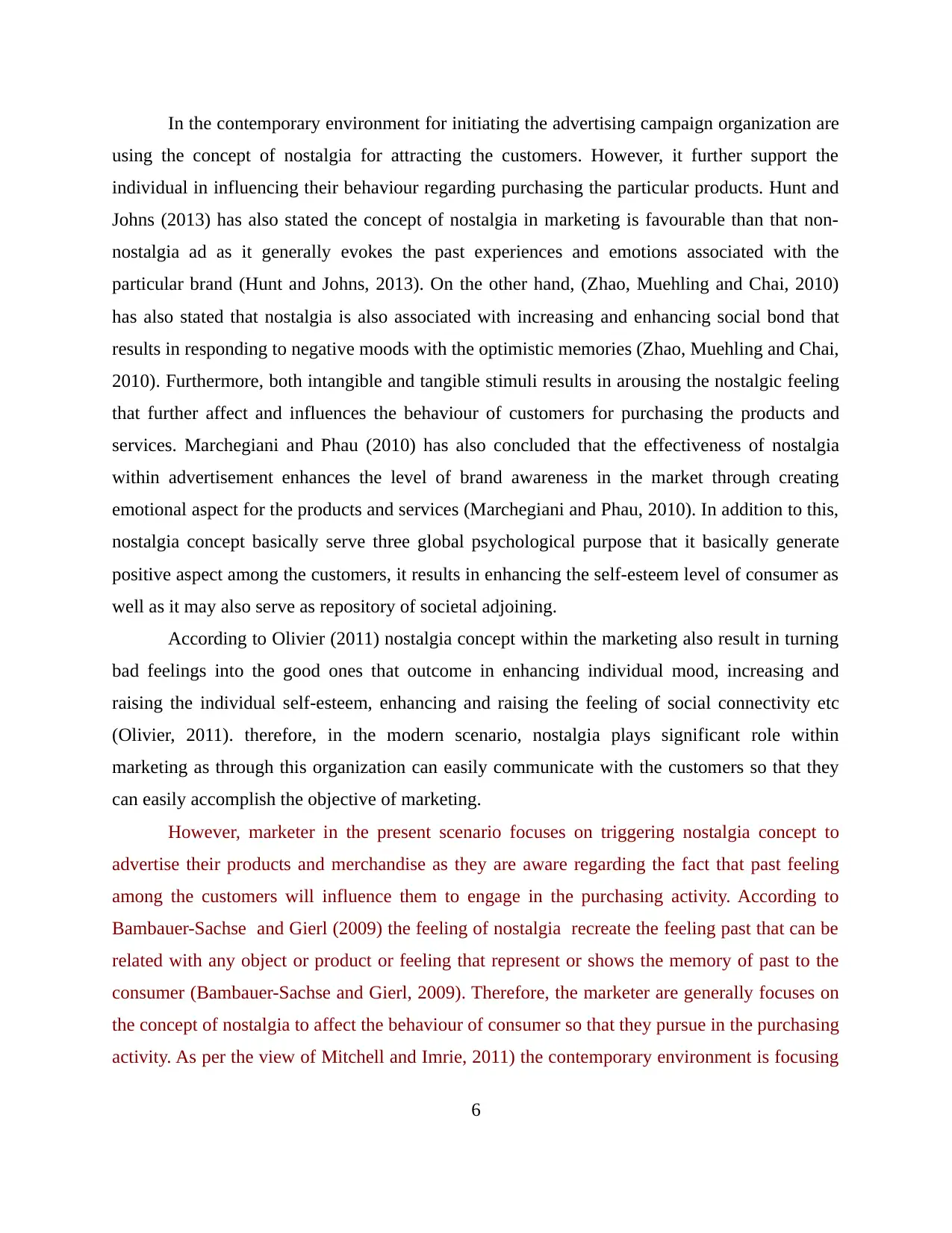
In the contemporary environment for initiating the advertising campaign organization are
using the concept of nostalgia for attracting the customers. However, it further support the
individual in influencing their behaviour regarding purchasing the particular products. Hunt and
Johns (2013) has also stated the concept of nostalgia in marketing is favourable than that non-
nostalgia ad as it generally evokes the past experiences and emotions associated with the
particular brand (Hunt and Johns, 2013). On the other hand, (Zhao, Muehling and Chai, 2010)
has also stated that nostalgia is also associated with increasing and enhancing social bond that
results in responding to negative moods with the optimistic memories (Zhao, Muehling and Chai,
2010). Furthermore, both intangible and tangible stimuli results in arousing the nostalgic feeling
that further affect and influences the behaviour of customers for purchasing the products and
services. Marchegiani and Phau (2010) has also concluded that the effectiveness of nostalgia
within advertisement enhances the level of brand awareness in the market through creating
emotional aspect for the products and services (Marchegiani and Phau, 2010). In addition to this,
nostalgia concept basically serve three global psychological purpose that it basically generate
positive aspect among the customers, it results in enhancing the self-esteem level of consumer as
well as it may also serve as repository of societal adjoining.
According to Olivier (2011) nostalgia concept within the marketing also result in turning
bad feelings into the good ones that outcome in enhancing individual mood, increasing and
raising the individual self-esteem, enhancing and raising the feeling of social connectivity etc
(Olivier, 2011). therefore, in the modern scenario, nostalgia plays significant role within
marketing as through this organization can easily communicate with the customers so that they
can easily accomplish the objective of marketing.
However, marketer in the present scenario focuses on triggering nostalgia concept to
advertise their products and merchandise as they are aware regarding the fact that past feeling
among the customers will influence them to engage in the purchasing activity. According to
Bambauer-Sachse and Gierl (2009) the feeling of nostalgia recreate the feeling past that can be
related with any object or product or feeling that represent or shows the memory of past to the
consumer (Bambauer-Sachse and Gierl, 2009). Therefore, the marketer are generally focuses on
the concept of nostalgia to affect the behaviour of consumer so that they pursue in the purchasing
activity. As per the view of Mitchell and Imrie, 2011) the contemporary environment is focusing
6
using the concept of nostalgia for attracting the customers. However, it further support the
individual in influencing their behaviour regarding purchasing the particular products. Hunt and
Johns (2013) has also stated the concept of nostalgia in marketing is favourable than that non-
nostalgia ad as it generally evokes the past experiences and emotions associated with the
particular brand (Hunt and Johns, 2013). On the other hand, (Zhao, Muehling and Chai, 2010)
has also stated that nostalgia is also associated with increasing and enhancing social bond that
results in responding to negative moods with the optimistic memories (Zhao, Muehling and Chai,
2010). Furthermore, both intangible and tangible stimuli results in arousing the nostalgic feeling
that further affect and influences the behaviour of customers for purchasing the products and
services. Marchegiani and Phau (2010) has also concluded that the effectiveness of nostalgia
within advertisement enhances the level of brand awareness in the market through creating
emotional aspect for the products and services (Marchegiani and Phau, 2010). In addition to this,
nostalgia concept basically serve three global psychological purpose that it basically generate
positive aspect among the customers, it results in enhancing the self-esteem level of consumer as
well as it may also serve as repository of societal adjoining.
According to Olivier (2011) nostalgia concept within the marketing also result in turning
bad feelings into the good ones that outcome in enhancing individual mood, increasing and
raising the individual self-esteem, enhancing and raising the feeling of social connectivity etc
(Olivier, 2011). therefore, in the modern scenario, nostalgia plays significant role within
marketing as through this organization can easily communicate with the customers so that they
can easily accomplish the objective of marketing.
However, marketer in the present scenario focuses on triggering nostalgia concept to
advertise their products and merchandise as they are aware regarding the fact that past feeling
among the customers will influence them to engage in the purchasing activity. According to
Bambauer-Sachse and Gierl (2009) the feeling of nostalgia recreate the feeling past that can be
related with any object or product or feeling that represent or shows the memory of past to the
consumer (Bambauer-Sachse and Gierl, 2009). Therefore, the marketer are generally focuses on
the concept of nostalgia to affect the behaviour of consumer so that they pursue in the purchasing
activity. As per the view of Mitchell and Imrie, 2011) the contemporary environment is focusing
6
⊘ This is a preview!⊘
Do you want full access?
Subscribe today to unlock all pages.

Trusted by 1+ million students worldwide
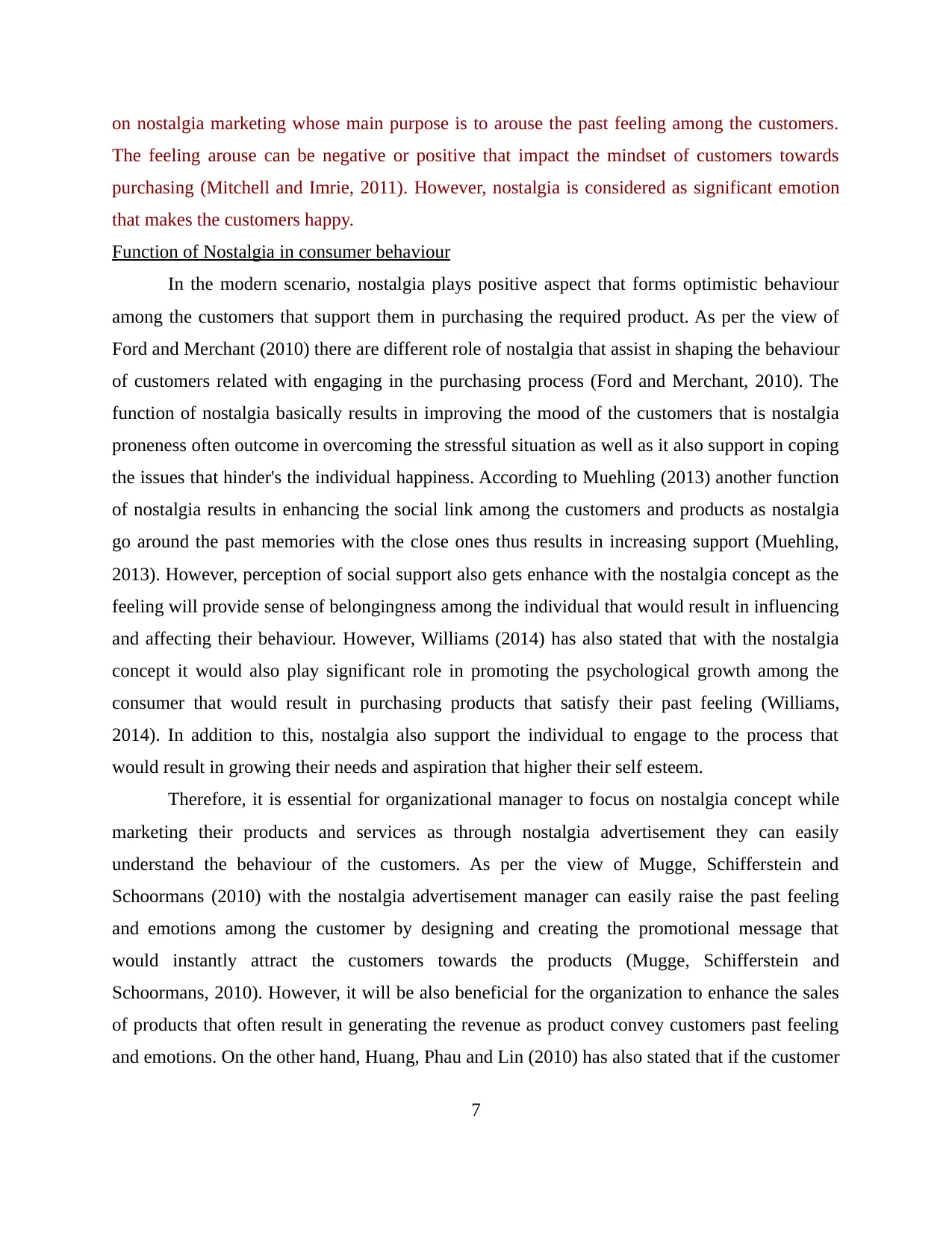
on nostalgia marketing whose main purpose is to arouse the past feeling among the customers.
The feeling arouse can be negative or positive that impact the mindset of customers towards
purchasing (Mitchell and Imrie, 2011). However, nostalgia is considered as significant emotion
that makes the customers happy.
Function of Nostalgia in consumer behaviour
In the modern scenario, nostalgia plays positive aspect that forms optimistic behaviour
among the customers that support them in purchasing the required product. As per the view of
Ford and Merchant (2010) there are different role of nostalgia that assist in shaping the behaviour
of customers related with engaging in the purchasing process (Ford and Merchant, 2010). The
function of nostalgia basically results in improving the mood of the customers that is nostalgia
proneness often outcome in overcoming the stressful situation as well as it also support in coping
the issues that hinder's the individual happiness. According to Muehling (2013) another function
of nostalgia results in enhancing the social link among the customers and products as nostalgia
go around the past memories with the close ones thus results in increasing support (Muehling,
2013). However, perception of social support also gets enhance with the nostalgia concept as the
feeling will provide sense of belongingness among the individual that would result in influencing
and affecting their behaviour. However, Williams (2014) has also stated that with the nostalgia
concept it would also play significant role in promoting the psychological growth among the
consumer that would result in purchasing products that satisfy their past feeling (Williams,
2014). In addition to this, nostalgia also support the individual to engage to the process that
would result in growing their needs and aspiration that higher their self esteem.
Therefore, it is essential for organizational manager to focus on nostalgia concept while
marketing their products and services as through nostalgia advertisement they can easily
understand the behaviour of the customers. As per the view of Mugge, Schifferstein and
Schoormans (2010) with the nostalgia advertisement manager can easily raise the past feeling
and emotions among the customer by designing and creating the promotional message that
would instantly attract the customers towards the products (Mugge, Schifferstein and
Schoormans, 2010). However, it will be also beneficial for the organization to enhance the sales
of products that often result in generating the revenue as product convey customers past feeling
and emotions. On the other hand, Huang, Phau and Lin (2010) has also stated that if the customer
7
The feeling arouse can be negative or positive that impact the mindset of customers towards
purchasing (Mitchell and Imrie, 2011). However, nostalgia is considered as significant emotion
that makes the customers happy.
Function of Nostalgia in consumer behaviour
In the modern scenario, nostalgia plays positive aspect that forms optimistic behaviour
among the customers that support them in purchasing the required product. As per the view of
Ford and Merchant (2010) there are different role of nostalgia that assist in shaping the behaviour
of customers related with engaging in the purchasing process (Ford and Merchant, 2010). The
function of nostalgia basically results in improving the mood of the customers that is nostalgia
proneness often outcome in overcoming the stressful situation as well as it also support in coping
the issues that hinder's the individual happiness. According to Muehling (2013) another function
of nostalgia results in enhancing the social link among the customers and products as nostalgia
go around the past memories with the close ones thus results in increasing support (Muehling,
2013). However, perception of social support also gets enhance with the nostalgia concept as the
feeling will provide sense of belongingness among the individual that would result in influencing
and affecting their behaviour. However, Williams (2014) has also stated that with the nostalgia
concept it would also play significant role in promoting the psychological growth among the
consumer that would result in purchasing products that satisfy their past feeling (Williams,
2014). In addition to this, nostalgia also support the individual to engage to the process that
would result in growing their needs and aspiration that higher their self esteem.
Therefore, it is essential for organizational manager to focus on nostalgia concept while
marketing their products and services as through nostalgia advertisement they can easily
understand the behaviour of the customers. As per the view of Mugge, Schifferstein and
Schoormans (2010) with the nostalgia advertisement manager can easily raise the past feeling
and emotions among the customer by designing and creating the promotional message that
would instantly attract the customers towards the products (Mugge, Schifferstein and
Schoormans, 2010). However, it will be also beneficial for the organization to enhance the sales
of products that often result in generating the revenue as product convey customers past feeling
and emotions. On the other hand, Huang, Phau and Lin (2010) has also stated that if the customer
7
Paraphrase This Document
Need a fresh take? Get an instant paraphrase of this document with our AI Paraphraser
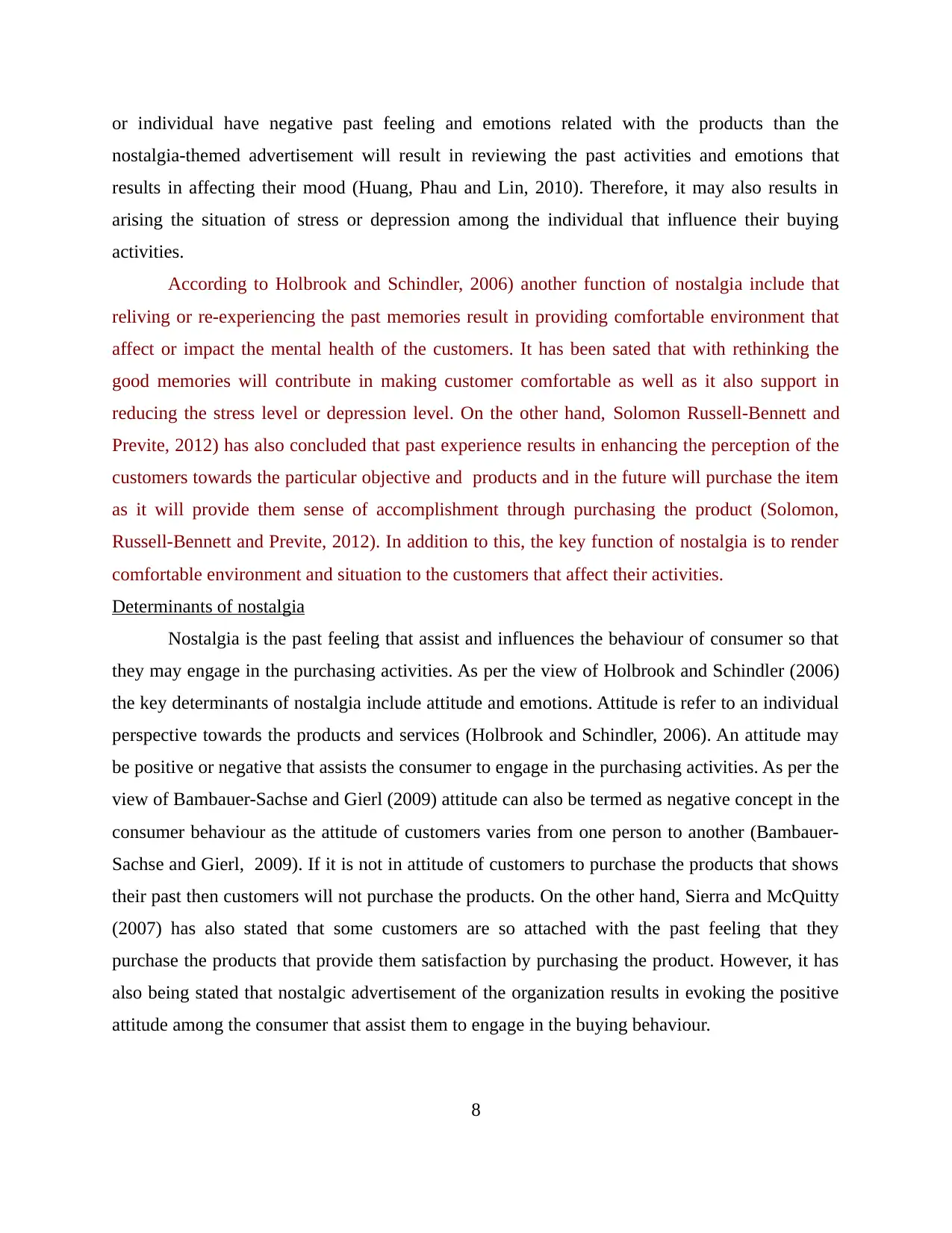
or individual have negative past feeling and emotions related with the products than the
nostalgia-themed advertisement will result in reviewing the past activities and emotions that
results in affecting their mood (Huang, Phau and Lin, 2010). Therefore, it may also results in
arising the situation of stress or depression among the individual that influence their buying
activities.
According to Holbrook and Schindler, 2006) another function of nostalgia include that
reliving or re-experiencing the past memories result in providing comfortable environment that
affect or impact the mental health of the customers. It has been sated that with rethinking the
good memories will contribute in making customer comfortable as well as it also support in
reducing the stress level or depression level. On the other hand, Solomon Russell-Bennett and
Previte, 2012) has also concluded that past experience results in enhancing the perception of the
customers towards the particular objective and products and in the future will purchase the item
as it will provide them sense of accomplishment through purchasing the product (Solomon,
Russell-Bennett and Previte, 2012). In addition to this, the key function of nostalgia is to render
comfortable environment and situation to the customers that affect their activities.
Determinants of nostalgia
Nostalgia is the past feeling that assist and influences the behaviour of consumer so that
they may engage in the purchasing activities. As per the view of Holbrook and Schindler (2006)
the key determinants of nostalgia include attitude and emotions. Attitude is refer to an individual
perspective towards the products and services (Holbrook and Schindler, 2006). An attitude may
be positive or negative that assists the consumer to engage in the purchasing activities. As per the
view of Bambauer-Sachse and Gierl (2009) attitude can also be termed as negative concept in the
consumer behaviour as the attitude of customers varies from one person to another (Bambauer-
Sachse and Gierl, 2009). If it is not in attitude of customers to purchase the products that shows
their past then customers will not purchase the products. On the other hand, Sierra and McQuitty
(2007) has also stated that some customers are so attached with the past feeling that they
purchase the products that provide them satisfaction by purchasing the product. However, it has
also being stated that nostalgic advertisement of the organization results in evoking the positive
attitude among the consumer that assist them to engage in the buying behaviour.
8
nostalgia-themed advertisement will result in reviewing the past activities and emotions that
results in affecting their mood (Huang, Phau and Lin, 2010). Therefore, it may also results in
arising the situation of stress or depression among the individual that influence their buying
activities.
According to Holbrook and Schindler, 2006) another function of nostalgia include that
reliving or re-experiencing the past memories result in providing comfortable environment that
affect or impact the mental health of the customers. It has been sated that with rethinking the
good memories will contribute in making customer comfortable as well as it also support in
reducing the stress level or depression level. On the other hand, Solomon Russell-Bennett and
Previte, 2012) has also concluded that past experience results in enhancing the perception of the
customers towards the particular objective and products and in the future will purchase the item
as it will provide them sense of accomplishment through purchasing the product (Solomon,
Russell-Bennett and Previte, 2012). In addition to this, the key function of nostalgia is to render
comfortable environment and situation to the customers that affect their activities.
Determinants of nostalgia
Nostalgia is the past feeling that assist and influences the behaviour of consumer so that
they may engage in the purchasing activities. As per the view of Holbrook and Schindler (2006)
the key determinants of nostalgia include attitude and emotions. Attitude is refer to an individual
perspective towards the products and services (Holbrook and Schindler, 2006). An attitude may
be positive or negative that assists the consumer to engage in the purchasing activities. As per the
view of Bambauer-Sachse and Gierl (2009) attitude can also be termed as negative concept in the
consumer behaviour as the attitude of customers varies from one person to another (Bambauer-
Sachse and Gierl, 2009). If it is not in attitude of customers to purchase the products that shows
their past then customers will not purchase the products. On the other hand, Sierra and McQuitty
(2007) has also stated that some customers are so attached with the past feeling that they
purchase the products that provide them satisfaction by purchasing the product. However, it has
also being stated that nostalgic advertisement of the organization results in evoking the positive
attitude among the consumer that assist them to engage in the buying behaviour.
8
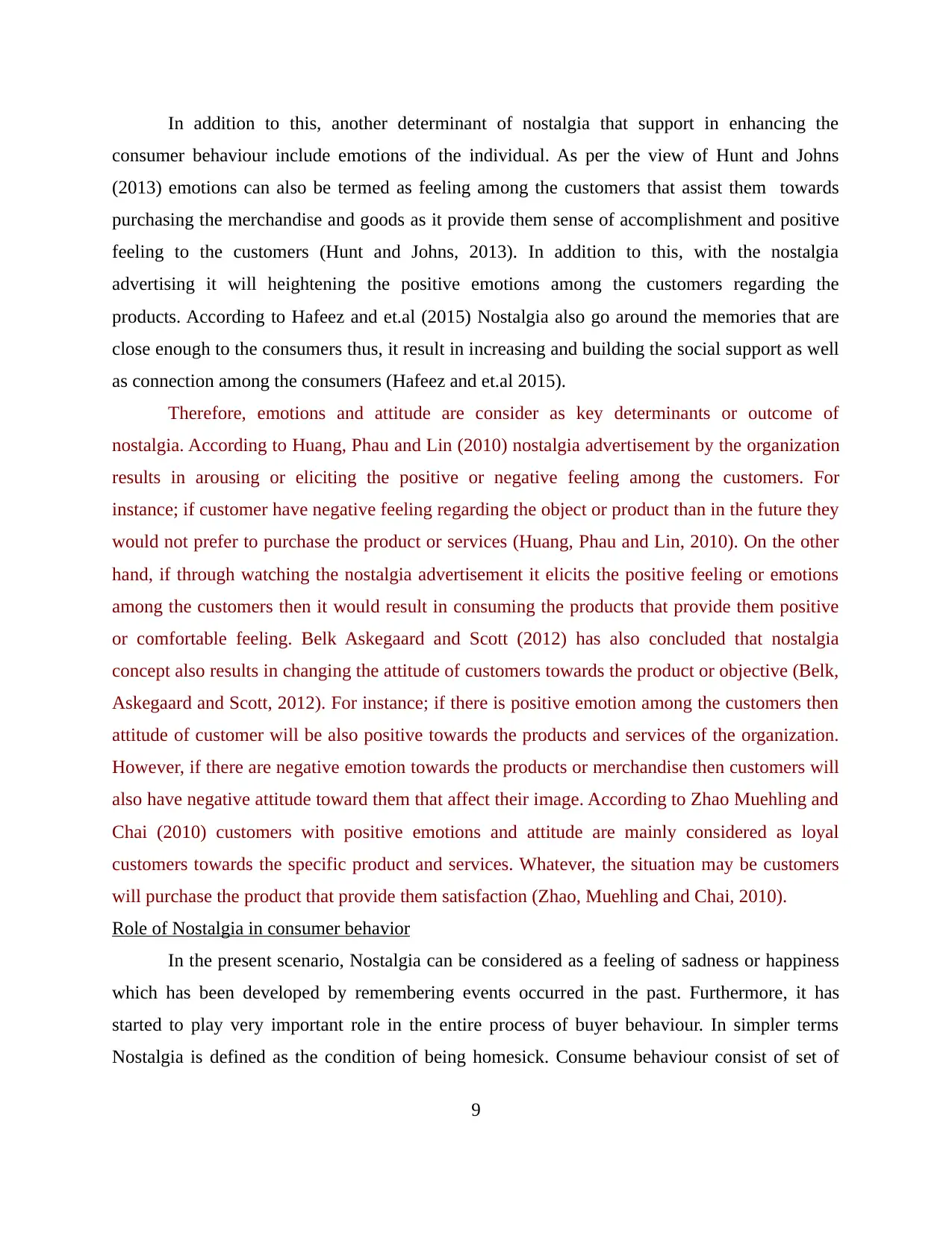
In addition to this, another determinant of nostalgia that support in enhancing the
consumer behaviour include emotions of the individual. As per the view of Hunt and Johns
(2013) emotions can also be termed as feeling among the customers that assist them towards
purchasing the merchandise and goods as it provide them sense of accomplishment and positive
feeling to the customers (Hunt and Johns, 2013). In addition to this, with the nostalgia
advertising it will heightening the positive emotions among the customers regarding the
products. According to Hafeez and et.al (2015) Nostalgia also go around the memories that are
close enough to the consumers thus, it result in increasing and building the social support as well
as connection among the consumers (Hafeez and et.al 2015).
Therefore, emotions and attitude are consider as key determinants or outcome of
nostalgia. According to Huang, Phau and Lin (2010) nostalgia advertisement by the organization
results in arousing or eliciting the positive or negative feeling among the customers. For
instance; if customer have negative feeling regarding the object or product than in the future they
would not prefer to purchase the product or services (Huang, Phau and Lin, 2010). On the other
hand, if through watching the nostalgia advertisement it elicits the positive feeling or emotions
among the customers then it would result in consuming the products that provide them positive
or comfortable feeling. Belk Askegaard and Scott (2012) has also concluded that nostalgia
concept also results in changing the attitude of customers towards the product or objective (Belk,
Askegaard and Scott, 2012). For instance; if there is positive emotion among the customers then
attitude of customer will be also positive towards the products and services of the organization.
However, if there are negative emotion towards the products or merchandise then customers will
also have negative attitude toward them that affect their image. According to Zhao Muehling and
Chai (2010) customers with positive emotions and attitude are mainly considered as loyal
customers towards the specific product and services. Whatever, the situation may be customers
will purchase the product that provide them satisfaction (Zhao, Muehling and Chai, 2010).
Role of Nostalgia in consumer behavior
In the present scenario, Nostalgia can be considered as a feeling of sadness or happiness
which has been developed by remembering events occurred in the past. Furthermore, it has
started to play very important role in the entire process of buyer behaviour. In simpler terms
Nostalgia is defined as the condition of being homesick. Consume behaviour consist of set of
9
consumer behaviour include emotions of the individual. As per the view of Hunt and Johns
(2013) emotions can also be termed as feeling among the customers that assist them towards
purchasing the merchandise and goods as it provide them sense of accomplishment and positive
feeling to the customers (Hunt and Johns, 2013). In addition to this, with the nostalgia
advertising it will heightening the positive emotions among the customers regarding the
products. According to Hafeez and et.al (2015) Nostalgia also go around the memories that are
close enough to the consumers thus, it result in increasing and building the social support as well
as connection among the consumers (Hafeez and et.al 2015).
Therefore, emotions and attitude are consider as key determinants or outcome of
nostalgia. According to Huang, Phau and Lin (2010) nostalgia advertisement by the organization
results in arousing or eliciting the positive or negative feeling among the customers. For
instance; if customer have negative feeling regarding the object or product than in the future they
would not prefer to purchase the product or services (Huang, Phau and Lin, 2010). On the other
hand, if through watching the nostalgia advertisement it elicits the positive feeling or emotions
among the customers then it would result in consuming the products that provide them positive
or comfortable feeling. Belk Askegaard and Scott (2012) has also concluded that nostalgia
concept also results in changing the attitude of customers towards the product or objective (Belk,
Askegaard and Scott, 2012). For instance; if there is positive emotion among the customers then
attitude of customer will be also positive towards the products and services of the organization.
However, if there are negative emotion towards the products or merchandise then customers will
also have negative attitude toward them that affect their image. According to Zhao Muehling and
Chai (2010) customers with positive emotions and attitude are mainly considered as loyal
customers towards the specific product and services. Whatever, the situation may be customers
will purchase the product that provide them satisfaction (Zhao, Muehling and Chai, 2010).
Role of Nostalgia in consumer behavior
In the present scenario, Nostalgia can be considered as a feeling of sadness or happiness
which has been developed by remembering events occurred in the past. Furthermore, it has
started to play very important role in the entire process of buyer behaviour. In simpler terms
Nostalgia is defined as the condition of being homesick. Consume behaviour consist of set of
9
⊘ This is a preview!⊘
Do you want full access?
Subscribe today to unlock all pages.

Trusted by 1+ million students worldwide
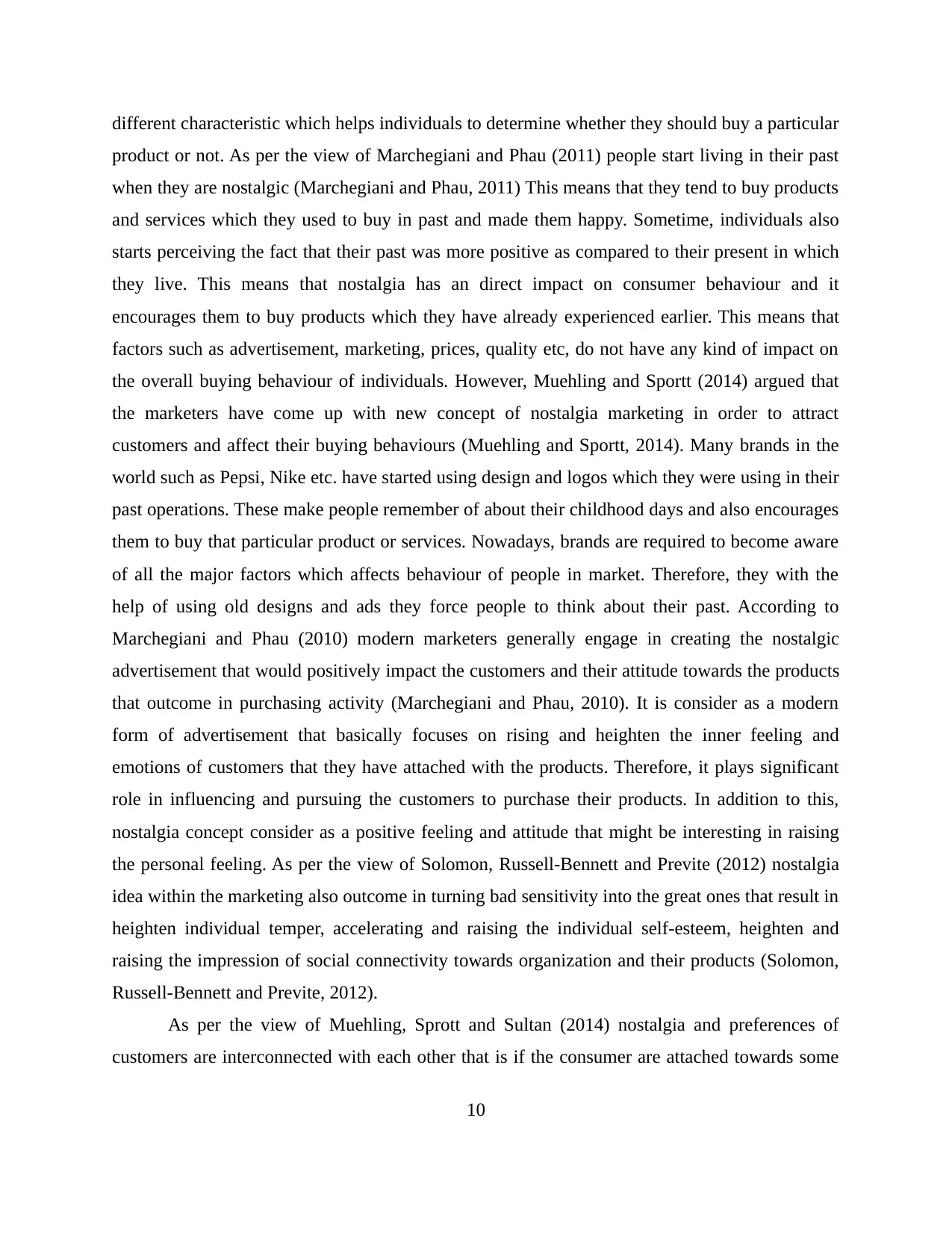
different characteristic which helps individuals to determine whether they should buy a particular
product or not. As per the view of Marchegiani and Phau (2011) people start living in their past
when they are nostalgic (Marchegiani and Phau, 2011) This means that they tend to buy products
and services which they used to buy in past and made them happy. Sometime, individuals also
starts perceiving the fact that their past was more positive as compared to their present in which
they live. This means that nostalgia has an direct impact on consumer behaviour and it
encourages them to buy products which they have already experienced earlier. This means that
factors such as advertisement, marketing, prices, quality etc, do not have any kind of impact on
the overall buying behaviour of individuals. However, Muehling and Sportt (2014) argued that
the marketers have come up with new concept of nostalgia marketing in order to attract
customers and affect their buying behaviours (Muehling and Sportt, 2014). Many brands in the
world such as Pepsi, Nike etc. have started using design and logos which they were using in their
past operations. These make people remember of about their childhood days and also encourages
them to buy that particular product or services. Nowadays, brands are required to become aware
of all the major factors which affects behaviour of people in market. Therefore, they with the
help of using old designs and ads they force people to think about their past. According to
Marchegiani and Phau (2010) modern marketers generally engage in creating the nostalgic
advertisement that would positively impact the customers and their attitude towards the products
that outcome in purchasing activity (Marchegiani and Phau, 2010). It is consider as a modern
form of advertisement that basically focuses on rising and heighten the inner feeling and
emotions of customers that they have attached with the products. Therefore, it plays significant
role in influencing and pursuing the customers to purchase their products. In addition to this,
nostalgia concept consider as a positive feeling and attitude that might be interesting in raising
the personal feeling. As per the view of Solomon, Russell-Bennett and Previte (2012) nostalgia
idea within the marketing also outcome in turning bad sensitivity into the great ones that result in
heighten individual temper, accelerating and raising the individual self-esteem, heighten and
raising the impression of social connectivity towards organization and their products (Solomon,
Russell-Bennett and Previte, 2012).
As per the view of Muehling, Sprott and Sultan (2014) nostalgia and preferences of
customers are interconnected with each other that is if the consumer are attached towards some
10
product or not. As per the view of Marchegiani and Phau (2011) people start living in their past
when they are nostalgic (Marchegiani and Phau, 2011) This means that they tend to buy products
and services which they used to buy in past and made them happy. Sometime, individuals also
starts perceiving the fact that their past was more positive as compared to their present in which
they live. This means that nostalgia has an direct impact on consumer behaviour and it
encourages them to buy products which they have already experienced earlier. This means that
factors such as advertisement, marketing, prices, quality etc, do not have any kind of impact on
the overall buying behaviour of individuals. However, Muehling and Sportt (2014) argued that
the marketers have come up with new concept of nostalgia marketing in order to attract
customers and affect their buying behaviours (Muehling and Sportt, 2014). Many brands in the
world such as Pepsi, Nike etc. have started using design and logos which they were using in their
past operations. These make people remember of about their childhood days and also encourages
them to buy that particular product or services. Nowadays, brands are required to become aware
of all the major factors which affects behaviour of people in market. Therefore, they with the
help of using old designs and ads they force people to think about their past. According to
Marchegiani and Phau (2010) modern marketers generally engage in creating the nostalgic
advertisement that would positively impact the customers and their attitude towards the products
that outcome in purchasing activity (Marchegiani and Phau, 2010). It is consider as a modern
form of advertisement that basically focuses on rising and heighten the inner feeling and
emotions of customers that they have attached with the products. Therefore, it plays significant
role in influencing and pursuing the customers to purchase their products. In addition to this,
nostalgia concept consider as a positive feeling and attitude that might be interesting in raising
the personal feeling. As per the view of Solomon, Russell-Bennett and Previte (2012) nostalgia
idea within the marketing also outcome in turning bad sensitivity into the great ones that result in
heighten individual temper, accelerating and raising the individual self-esteem, heighten and
raising the impression of social connectivity towards organization and their products (Solomon,
Russell-Bennett and Previte, 2012).
As per the view of Muehling, Sprott and Sultan (2014) nostalgia and preferences of
customers are interconnected with each other that is if the consumer are attached towards some
10
Paraphrase This Document
Need a fresh take? Get an instant paraphrase of this document with our AI Paraphraser
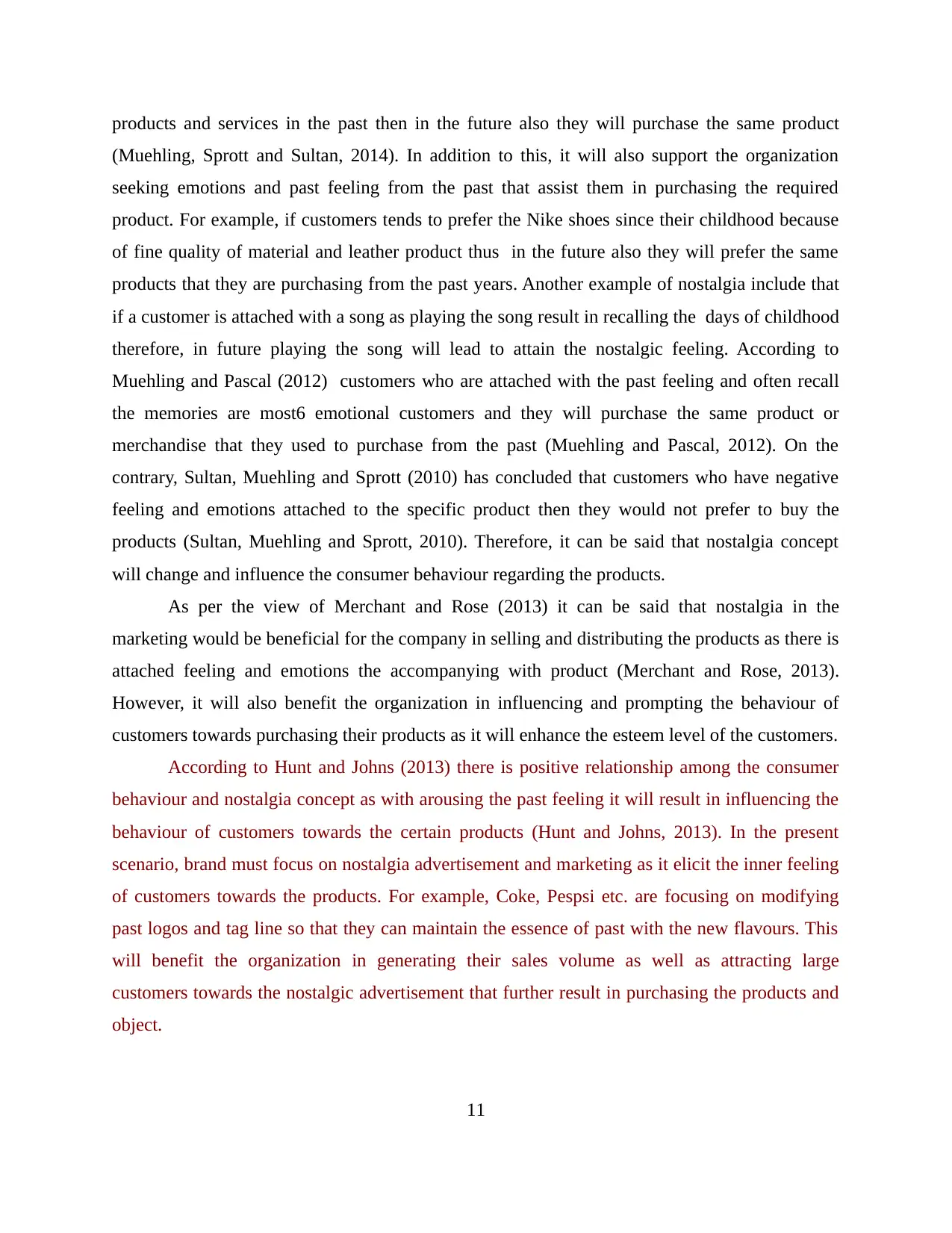
products and services in the past then in the future also they will purchase the same product
(Muehling, Sprott and Sultan, 2014). In addition to this, it will also support the organization
seeking emotions and past feeling from the past that assist them in purchasing the required
product. For example, if customers tends to prefer the Nike shoes since their childhood because
of fine quality of material and leather product thus in the future also they will prefer the same
products that they are purchasing from the past years. Another example of nostalgia include that
if a customer is attached with a song as playing the song result in recalling the days of childhood
therefore, in future playing the song will lead to attain the nostalgic feeling. According to
Muehling and Pascal (2012) customers who are attached with the past feeling and often recall
the memories are most6 emotional customers and they will purchase the same product or
merchandise that they used to purchase from the past (Muehling and Pascal, 2012). On the
contrary, Sultan, Muehling and Sprott (2010) has concluded that customers who have negative
feeling and emotions attached to the specific product then they would not prefer to buy the
products (Sultan, Muehling and Sprott, 2010). Therefore, it can be said that nostalgia concept
will change and influence the consumer behaviour regarding the products.
As per the view of Merchant and Rose (2013) it can be said that nostalgia in the
marketing would be beneficial for the company in selling and distributing the products as there is
attached feeling and emotions the accompanying with product (Merchant and Rose, 2013).
However, it will also benefit the organization in influencing and prompting the behaviour of
customers towards purchasing their products as it will enhance the esteem level of the customers.
According to Hunt and Johns (2013) there is positive relationship among the consumer
behaviour and nostalgia concept as with arousing the past feeling it will result in influencing the
behaviour of customers towards the certain products (Hunt and Johns, 2013). In the present
scenario, brand must focus on nostalgia advertisement and marketing as it elicit the inner feeling
of customers towards the products. For example, Coke, Pespsi etc. are focusing on modifying
past logos and tag line so that they can maintain the essence of past with the new flavours. This
will benefit the organization in generating their sales volume as well as attracting large
customers towards the nostalgic advertisement that further result in purchasing the products and
object.
11
(Muehling, Sprott and Sultan, 2014). In addition to this, it will also support the organization
seeking emotions and past feeling from the past that assist them in purchasing the required
product. For example, if customers tends to prefer the Nike shoes since their childhood because
of fine quality of material and leather product thus in the future also they will prefer the same
products that they are purchasing from the past years. Another example of nostalgia include that
if a customer is attached with a song as playing the song result in recalling the days of childhood
therefore, in future playing the song will lead to attain the nostalgic feeling. According to
Muehling and Pascal (2012) customers who are attached with the past feeling and often recall
the memories are most6 emotional customers and they will purchase the same product or
merchandise that they used to purchase from the past (Muehling and Pascal, 2012). On the
contrary, Sultan, Muehling and Sprott (2010) has concluded that customers who have negative
feeling and emotions attached to the specific product then they would not prefer to buy the
products (Sultan, Muehling and Sprott, 2010). Therefore, it can be said that nostalgia concept
will change and influence the consumer behaviour regarding the products.
As per the view of Merchant and Rose (2013) it can be said that nostalgia in the
marketing would be beneficial for the company in selling and distributing the products as there is
attached feeling and emotions the accompanying with product (Merchant and Rose, 2013).
However, it will also benefit the organization in influencing and prompting the behaviour of
customers towards purchasing their products as it will enhance the esteem level of the customers.
According to Hunt and Johns (2013) there is positive relationship among the consumer
behaviour and nostalgia concept as with arousing the past feeling it will result in influencing the
behaviour of customers towards the certain products (Hunt and Johns, 2013). In the present
scenario, brand must focus on nostalgia advertisement and marketing as it elicit the inner feeling
of customers towards the products. For example, Coke, Pespsi etc. are focusing on modifying
past logos and tag line so that they can maintain the essence of past with the new flavours. This
will benefit the organization in generating their sales volume as well as attracting large
customers towards the nostalgic advertisement that further result in purchasing the products and
object.
11
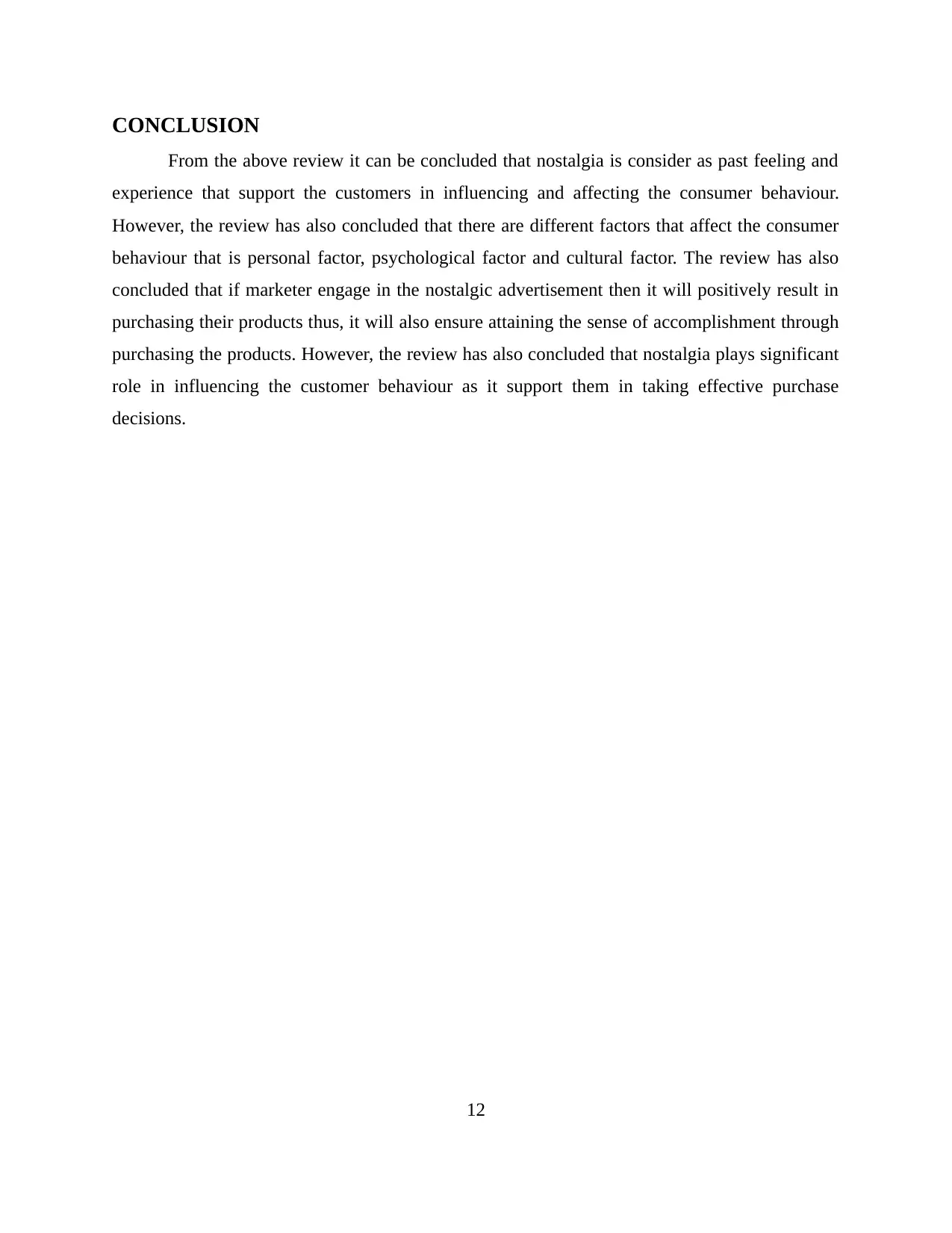
CONCLUSION
From the above review it can be concluded that nostalgia is consider as past feeling and
experience that support the customers in influencing and affecting the consumer behaviour.
However, the review has also concluded that there are different factors that affect the consumer
behaviour that is personal factor, psychological factor and cultural factor. The review has also
concluded that if marketer engage in the nostalgic advertisement then it will positively result in
purchasing their products thus, it will also ensure attaining the sense of accomplishment through
purchasing the products. However, the review has also concluded that nostalgia plays significant
role in influencing the customer behaviour as it support them in taking effective purchase
decisions.
12
From the above review it can be concluded that nostalgia is consider as past feeling and
experience that support the customers in influencing and affecting the consumer behaviour.
However, the review has also concluded that there are different factors that affect the consumer
behaviour that is personal factor, psychological factor and cultural factor. The review has also
concluded that if marketer engage in the nostalgic advertisement then it will positively result in
purchasing their products thus, it will also ensure attaining the sense of accomplishment through
purchasing the products. However, the review has also concluded that nostalgia plays significant
role in influencing the customer behaviour as it support them in taking effective purchase
decisions.
12
⊘ This is a preview!⊘
Do you want full access?
Subscribe today to unlock all pages.

Trusted by 1+ million students worldwide
1 out of 14
Related Documents
Your All-in-One AI-Powered Toolkit for Academic Success.
+13062052269
info@desklib.com
Available 24*7 on WhatsApp / Email
![[object Object]](/_next/static/media/star-bottom.7253800d.svg)
Unlock your academic potential
Copyright © 2020–2026 A2Z Services. All Rights Reserved. Developed and managed by ZUCOL.





